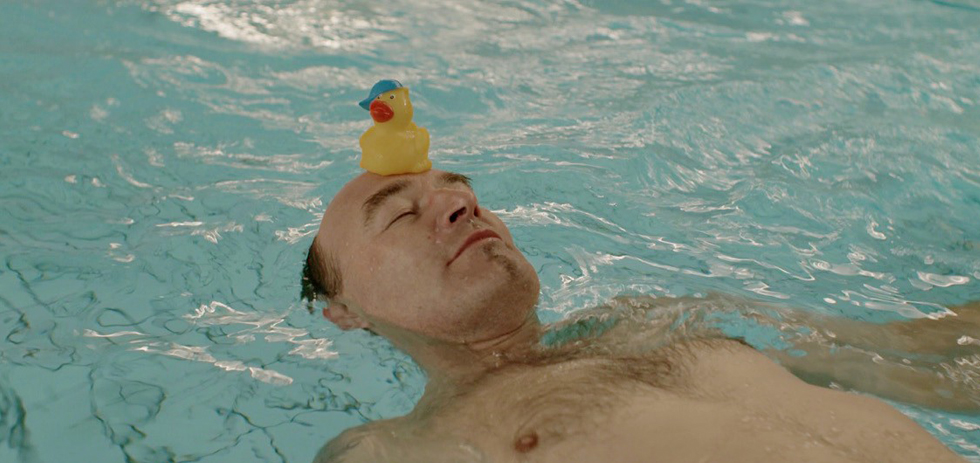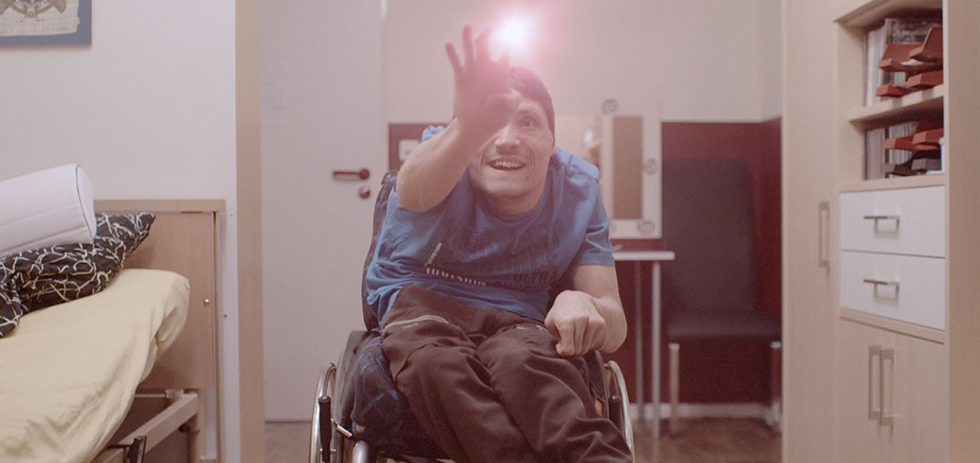The Humanitarians is a two-part documentary about the unconventional types of intimacy that may be experienced by those with disabilities. The plot revolves around Jochen first, before moving onto Sven’s story. Jochen is intellectually disabled. He is still functional – he works, has friends, goes to bars; he is also largely independent and when he needs help his sister is there for him. The opening credits are backed by the song ‘Put Yourself in My Place’ with the memorable chorus: “put yourself in my place…when you lose a little sleep at night because you ain’t been treated right…sitting by the telephone, being left all alone…then you know why I’m feeling bad. Put yourself in my place”. This song serves as a poignant introduction to a film about the difficulties faced by disabled people in their search for intimacy, and it urges the audience to be compassionate and non-judgmental when we meet Jochen in the opening scene.
Jochen is visiting a counsellor. We see a medium shot of his head and torso. He’s looking away from the camera and we can hear the soothing tones of his counsellor, although we cannot see her. Looking at Jochen, we cannot tell that he has a disability. He is a thirty-something year old dressed in ordinary clothes. He’s slightly balding and has two earrings and glasses. Then the counsellor asks if he knows why he’s here and he shakes his head and explains calmly that his sister told him to come. The counsellor explains that he is here because he has been stalking and harassing a prostitute he had been seeing at a brothel. She asks if he remembers being sent to the police station and he replies that he doesn’t, however, insinuates that ending up at there isn’t a new thing for him; just that he never understands why he has to go there. She explains that the woman does not want him coming too close, and does not want him trying to touch her. But he is bewildered and annoyed. “I love this woman,” he says, “I don’t understand.” The camera angle changes; we see the back of his head, and the blurred silhouette of the counsellor. She gently explains, “When someone says no, it’s important to accept that.”
The scene is serene and sets the tone for the rest of the film. There are times of tension, such as when Jochen’s sister tries to confiscate his porn magazines, but for the most part, the characters are softly spoken and kind to one another. This tone is key to the empathetic portrayal of Jochen. We are so accustomed to hearing about these events in the media, and we are quick to jump to the victim’s defence and to vilify the perpetrator. The Humanitarians offers us an alternative perspective. When we meet the woman Jochen loves he has run into her in a supermarket. She ignores him when he tries to speak to her. But at the cash register, when she is short of change, she turns around and demands that he give her cash. He does, and she still refuses to talk to him. On the one hand, we can understand how frustrated and violated she must feel. But on the other hand, we are given insight into Jochen’s mind. He whom we would consider predatory or creepy under different circumstances, is humanised in the soft light of compassion. Jochen looks like any other person, but he lacks social awareness and social skills. He tries over and over again to connect to others and to love them, but he is constantly misunderstood. From this perspective, the woman demanding his cash, knowing that he is hopelessly in love with her, seems somewhat heartless.
Jochen’s story is a wonderful counterpoint to the second half of the film, where we meet Sven, who is in a wheelchair due to motor neuron disease. Like Jochen, he is highly functional. He is outgoing, charming and articulate. At the train station, he has no problem going up to a stranger and asking them to help him onto the train by lifting his wheelchair. While Jochen’s disability is invisible, Sven’s is visible, and the issues he faces in intimate relationships are very different. We see him calling up escorts and explain chirpily that he’s in a wheelchair. A few turn him down, but we witness two of his sexual encounters. The first is with a male escort. We see Sven book him over the phone. When the escort agrees to see him, his excitement is palpable and infectious. He grins at the screen and explains, “I’m really stunned. I must admit.” It is reminiscent of the trope of the lovestruck schoolboy, except that Sven is a grown adult, and he’s excited over someone agreeing to have paid sex with him.
The scene then cuts to Sven and his escort post-coital. The viewer is directly facing the head of the bed, and we see the escort stand up and put on his underwear. Sven props himself up and watches him. He watches him put his socks on. There is no conversation, no eye contact, not even a smile. The tension of the situation is escalated by the lack of non-diegetic sound. We feel awkward for Sven. He stares into the distance, wondering what to do or say. The escort moves around the corner to put on the rest of his clothes. Sven tries to turn his head to watch him, but he can’t, and it’s too difficult for him to reposition himself because of his physical disability, so he remains in bed, staring straight ahead, into the camera. For a brief moment he smiles apologetically, as if to say, sorry this is so awkward for you to watch. It is an unusual power dynamic, because even though Sven is paying for sex, he does not feel like he has the right to force the escort to converse with him due to his disability. He explains this later, saying that because not every escort is willing to be with someone in a wheelchair, he often gets ripped off. He pays for a blowjob, a handjob and sex, but all he gets is a blowjob and then they leave, but still charge him the full amount. As a viewer, the contrast between Sven’s personality out of and inside the bedroom, is painful to watch. Fully clothed, he is bubbly and charismatic. He speaks freely about his urges and his desire for intimacy. But in the bedroom, the power dynamic is such that he ends up paying much more than a non-disabled person would for sex.
Some elements of the film are less successful. For example, there is a scene where a woman in a wheelchair sitting in the background ascends into the sky. It is unexplained, and the only element of magical realism in the entire film, such that I had trouble believing it happened at all. In his statement on the film, director Maximillian Haslberger, writes, “A paradox I had to deal with in making this project was the question of how to make a film about paternalism and at the same time not to make a film about the others. The form should therefore not act in accordance with any sort of classification, but to free the film from any such system. I wanted…a film that employed the tools of the documentary as well as the mise-en-scene and animation – people in wheelchairs who are not bound by incapacity but rather enabled. The film’s refusal of a clear cinematic category reflects my ethos in making it: there are people, there is cinema. There is no necessity for more classification.” Certainly, the film successful weaves elements of cinema with documentary. However, I’m not sure what Haslberger is referring to when he mentions “animation”.
That said, Haslberger’s concept is intelligent and well-considered, and very relevant to the field of disability studies. For example, Jochan’s relationship with his sister is interesting to observe, as is her attitude towards him having pornography. It raises the question, would she be disturbed by his possession of pornography if he were not disabled? Or is her disturbance reflective of the paternalistic nature of her care for him? Even so, the first part of the film moves a bit too slowly, partly because Jochan doesn’t offer the reflective and insightful commentary that Sven does.
The Humanitarians is a tender film. At a little over one and a half hours, it feels slightly too long. There is a wonderful conversation Sven has with his friend towards the end of the film, where he questions what a relationship would even mean to him as a disabled person. In a way, his plight seems sadder than Jochan’s because he can understand everything that is happening to him, and all the ways in which society is denying him opportunities that others take for granted. His observations deviate into the more conceptual, when he remarks, “I think I’m not really sure what a relationship would mean for me. Sometimes I think I’m not made for a partnership. Maybe I just can’t do it. Because I don’t have any clue or clear image of what that would be or what that would look like for me.” His comments relate to broader societal and textual representations of the disabled as sexless and infantalised. Essentially, this is the very notion that The Humanitarians as a film attempts to break down. It wants the viewer to understand that people with disabilities, whether they be physical or intellectual, still have that strong human desire for intimacy.


